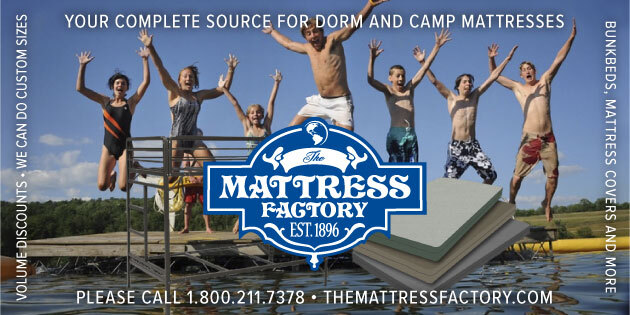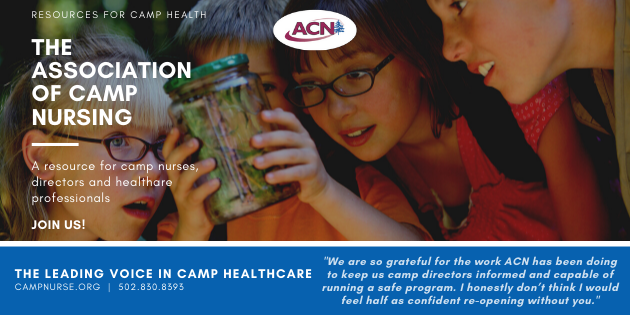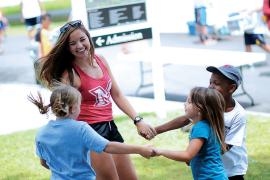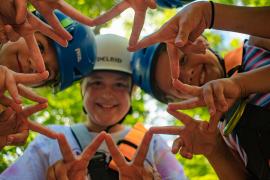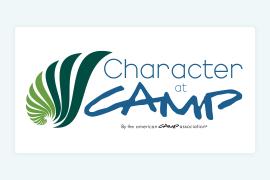When you look back over your childhood, is there an adult outside of your family — a teacher, coach, camp counselor, or mentor — who told you something positive about yourself that you still remember today? Their positive words may even be something you still repeat to yourself. "I can do hard things," "I am courageous," "I am persistent," or "I listen well to others" are examples of affirmations you might have internalized about yourself because someone you looked up to pointed out that trait.
As Michael Brandwein so beautifully illustrates in his staff training exercise, A letter to my child's staff person…, "a single meaningful compliment from an adult who is not your parent can have a powerful and lasting impact" (2004).
This summer, you'll learn and develop your leadership, time management, card playing, and toilet plunging know-how. You'll have a positive impact on the campers you serve by teaching them new skills, helping them make friends, and creating fun, memorable moments for them. But perhaps the most important thing you can do for your campers is to send them home with the memory of a meaningful compliment, something you noticed and shared with them that they'll remember long after they've left camp — possibly even for decades. If you're intentional about what you say to your campers and how you compliment them, your words truly can have a powerful and positive lasting impact.
To train her staff on how to affirm campers and offer these kinds of meaningful compliments, camp owner and director and Gallup Strengths Coach Sara Kuljis (Yosemite Sierra Summer Camp and Emerald Cove Day Camp) developed a simple way to remember the different kinds of compliments we can (and should!) give our campers. Kuljis has taught me — and many other camp professionals and parents — about "level three affirmations."
If you want to send your campers home knowing something special you've seen in them, the character gold they have within them, here are Kuljis's blueprint and training guidelines.
Sara Kuljis's "Levels of Affirmation"
There are three levels of affirmations you can give campers. All kinds of compliments will make your campers feel good, but level three affirmations are the ones that have the potential to change campers' lives.
Level One Affirmations
Level one affirmations are words that convey worth, value, and importance in one's possessions or one's physical appearance. Examples: "You have beautiful hair." "That's a really cool new skateboard."
These are the most common kind of compliments and the ones that roll easily off our tongues. Of course it feels good to receive compliments of any kind, including about our appearance or a new purchase, but compliments on physical traits or material possessions that a child doesn't have a lot of control over have the potential to create a sense of insecurity if they're the only kind of compliments that come their way. There's nothing wrong with level one affirmations and, in fact, they feel good to receive. But we definitely don't want to stop there at a surface level.
Level Two Affirmations
Level two affirmations are words that convey worth, value, and importance in one's performance or accomplishments. Examples: "You are so good at explaining things to others." and "You were amazing at the skate park today." For teens and young adults, these are usually affirmations about academic, artistic, or athletic awards or accomplishments; for example, being admitted to a prestigious university.
According to Kuljis, "Parents hover in level two a lot. At camp and at school, we often emphasize the skill they've learned, and it's awesome to affirm that in a child. But our kids are buried by the sense that they have to outperform and accomplish way beyond what any reasonable expectation is. When affirmations get stuck at level two, where we value and shine a light almost exclusively on the importance of accomplishments and performance, we are doing our kids (and our campers) a great disservice."
Many of us can relate, having been raised by parents who affirmed us primarily for our accomplishments. This can result in having really high expectations for ourselves (a good thing), but it can also lead to a destructive kind of perfectionism, where we feel like no matter what we do, it's never enough.
Your campers this summer come to you with the fundamental human need to be valued. They are likely accustomed to seeking validation for what they do or accomplish, as that is how many will have received positive attention from the adults in their lives. They will, of course, enjoy you pointing out and complimenting them on new skills they learn and goals they achieve. But by showing them that you value them for much more than their accomplishments at camp — that you see more of what's inside them — you can encourage them to be their best selves.
Level Three Affirmations
Level three affirmations are words that convey worth, value, and importance in one's efforts, character, and in one's very being. Examples include affirmations such as "I really admire how kind you are to everyone. Whether you know them or not, you treat people with such warmth and respect." Or "I admire how hard you've been working to improve your skating skills. You've been out there every day. I appreciate your grit and determination."
Positive character traits — the kinds we point out when we give a level three affirmation — are more likely to develop and grow in children when they are acknowledged and praised.
Kuljis teaches that the way to give a level three affirmation is to praise the process that the child went through to accomplish something. If we look at the process, we look for and point out character traits such as determination, perseverance, grit, inclusivity, and kindness. Kuljis describes these important traits as "all of the really deep character traits we're all hoping our kids have."
This kind of character or process praise is also called "growth mindset" praise and has lasting benefits. Growth mindset praise like, "Wow! You really kept trying to get across that ropes course, even when it was hard and you were scared. You showed a lot of courage and grit," encourages children to continue to build that trait.
Naming some of those character traits for kids is helpful to their lifelong growth and development. When you, a trusted adult, identify something great you see in them, your campers will be encouraged to continue using and developing that trait. When their kindness, energy, resilience — their gift for seeing what's going on, for organizing events, or for including people — are identified and praised, they're more likely to continue developing and using those positive attributes everywhere in their lives. If those traits are not recognized, nurtured, and valued, they're less likely to grow. Let's help campers name the character traits that make them valuable and important members of our group, our camp, and the world.
This summer, when you look for and see one of your campers doing something well, identify a character trait or strength that is helping that camper succeed. Compliment them not just on the achievement, but on the underlying strength the camper used. Here are some examples:
- When you see a camper helping another camper, you can say, "Your kindness to others makes you a really good friend."
- When a camper who is nervous persists and gives a new activity a try, you can say, "I'm so impressed by your courage to try even when you were nervous. Your courage is going to help you do great things!"
- To a quieter, more observant camper, you can say, "I really appreciate how well you listen to others and are thoughtful before you speak. Listening well is a trait that makes you stand out in our group."
- For a sensitive camper, you can say, "Your observance of and sensitivity to the feelings of others is remarkable. I've rarely seen a kid your age show so much empathy and feel so much compassion for others."
The world needs more people who are kind, patient, resilient, and generous, but those are not traits that get complimented as often by parents and other adults. Let's help grow those traits in campers this summer by pointing out to them when we see them demonstrate those traits. And while we can still compliment the great T-shirt and the bull's-eye at archery, know that the level three character affirmations you give your campers can have a positive, lasting impact on their lives. You may even be remembered, years from now, as the adult who discovered and identified their most valuable gift.
Additional Resources
For more information on effective affirmations and having a positive impact on children, refer to these resources:
- Training Terrific Staff, by Michael Brandwein: michaelbrandwein.com/products/trainingterrificstaff.html
- "Creating a Strengths-Based Camp" (Camping Magazine, November/December 2017): ACAcamps.org/resource-library/camping-magazine/creating-strengths-based-camp
- The Power of Compliments, Audrey Monke, Sunshine Parenting: sunshine-parenting.com/the-power-of-compliments-2/
- Sunshine Parenting Ep. 115: "Giving Kids Meaningful Compliments with Sara Kuljis": sunshine-parenting.com/ep-115/
Discussion Questions:
- Do you find it harder to give or take a compliment? Why?
- What level three affirmation sticks out in your mind as the best compliment you've received? What was its lasting impact?
- Devise a plan to give your campers more character-based affirmations based on traits such as kindness, patience, resilience, and generosity. What will you do?
Audrey Monke, with her husband Steve, has owned and directed Gold Arrow Camp (Lakeshore, California) since 1989. On her website (sunshine-parenting.com) Audrey shares resources for parents and youth development professionals about summer camp, parenting, and happiness. Her podcast (Sunshine Parenting) features interviews with parenting authors and experts, including camp directors. Audrey's book, Happy Campers: 9 Summer Camp Secrets for Raising Kids Who Become Thriving Adults (Hachette, 2019), shares strategies for bringing the magic of camp home.
Photo courtesy of Camp Champions, Marble Falls, TX.
Reference
- Brandwein, M. (2004). Training terrific staff: A handbook of practical and creative tools for camp. Michael Brandwein.

